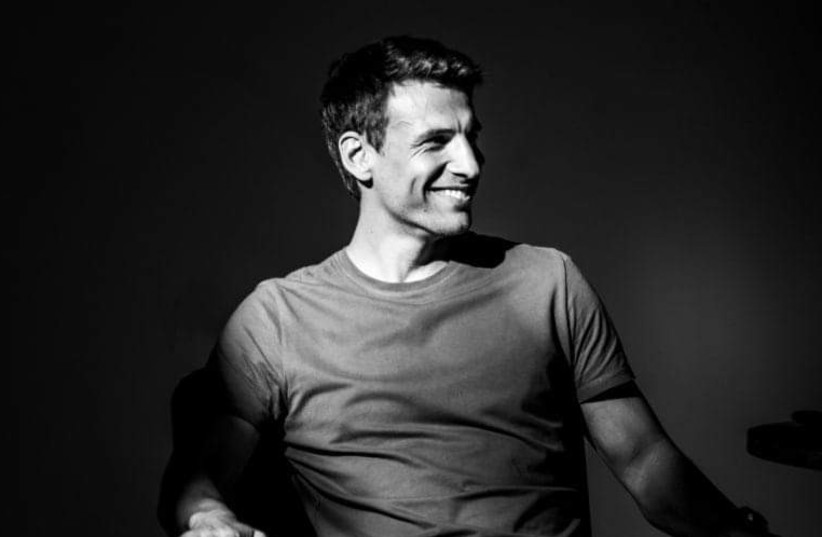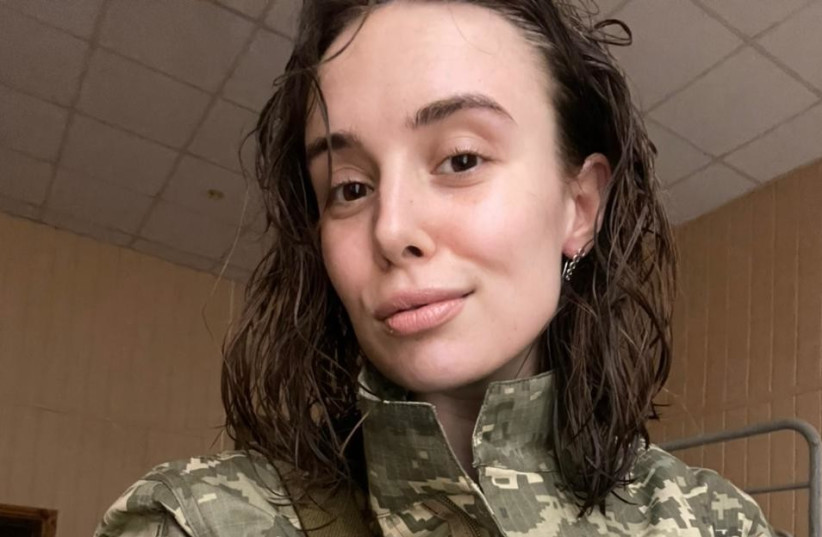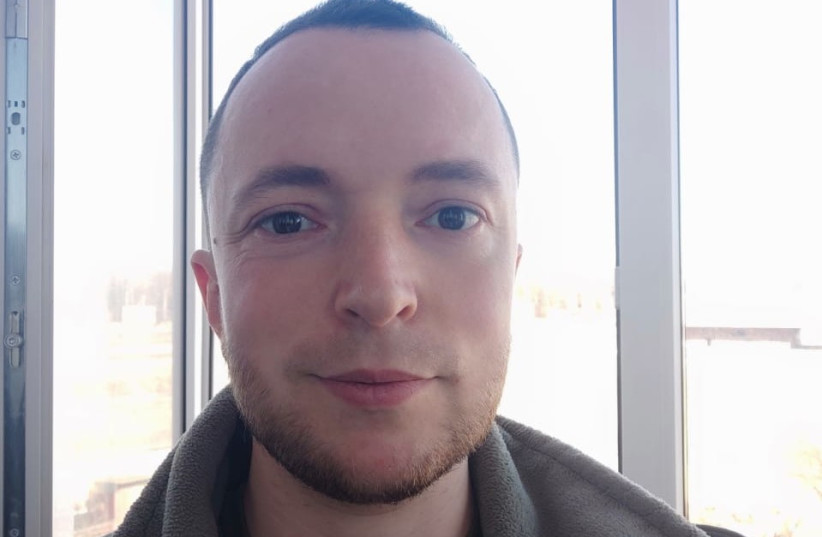It was a war that no one thought would arrive at their doorstep. For over eight years, Ukraine has been at war with Russia. But in February, a full-blown invasion by Moscow brought the war to Kyiv and the entire country.
Millions fled, worried that the Russian military would bring death and destruction to their lives. But while countless women and children crossed into neighboring countries, men stayed behind to fight. Ukrainians from regular nine-to-five jobs suddenly found themselves brandishing weapons on the frontlines in order to stop Russian troops from advancing.
“We couldn’t even imagine a situation like this,” Michael (Misha) Chernomorets, an Israeli citizen living in Kharkiv, said by phone.
Even though Russia had amassed up to 200,000 troops along Ukraine’s borders prior to the invasion, many still held out hope that Putin wouldn’t invade.
“Our government and even the mayor of Kharkiv could not imagine such a situation,” said Chernomorets. “The deputies told the mayor a week before the war to check the shelters, but the mayor didn’t listen and said not to panic.”
Kharkiv, Ukraine’s second-largest city with over two million population, has been under heavy bombardment by Russian artillery since the invasion began. The streets of the city, once full of life with residents crowding restaurants, theaters and universities, are now abandoned.
The relentless barrage of artillery shelling has destroyed the city, and left dozens dead and wounded. Food and water are also running out for those who have remained there and are seeking shelter.
“It’s a humanitarian catastrophe” in Kharkiv, Chernomorets said. “Over 800 buildings have been destroyed. We don’t even have water, and a lot of districts in Kharkiv have no heating. It’s horrible. It’s spring, but it’s bad weather with temperatures at -15 degrees, and the nights are very cold and the shelters are not prepared to handle that.”

Misha, who was a businessman before the war with restaurants and green energy projects in western Ukraine, was speaking between bombardments. Born in Kharkiv, he moved to Israel with his family when he was young and spent several years in the country before moving back to his hometown. His siblings are still in Eilat, and his sister serves in the IDF.
Strongly connected to Israel and the Jewish community in Kharkiv, Misha knew about wars in Israel but never thought that war would break out in Europe.
“If we spoke maybe 10 years ago, I would never have imagined it,” he said. “Our countries are like brothers... we have the same artists, films, even when our sportsmen go to the Olympics or other championships and win, we see them as ours. Only when [the war] in Donetsk and Luhansk began eight years ago did we realize that we were not brothers. Our neighbors thought that we are part of Russia and that they can tell us how to live, but we are an independent nation.
“We couldn’t believe that our neighbor would bomb our women and children. We live in the modern world, and in Europe, and we can’t even imagine that someone would do this.”

Chernomorets said that while Russian troops had entered the city at the beginning of the war, and residents of the city “were fighting them with bombs and Kalashnikovs,” there are no more Russian troops in town. Rather, they are shelling the city from the neighboring villages.
But the residents of Kharkiv are not giving up without a fight.
“We are very proud of our country, and because of Putin we have been able to connect to our country and we are strong like never before,” said Chernomorets. “Our people – women and men all over the world – are very angry, and we will fight even if we don’t have weapons. This is our land.”

While he is grateful for the support from around the world, Chernomorets said he is hurt that Israel has not done more.
“This was a surprise for me,” he said. “I am very connected to Israel. It is very sad that Israel isn’t supporting us against Russia. Israel is not doing what other European countries are doing... Israel has to remember the past, how Germany started a war with Poland and what came afterward... We see what is happening in Ukraine right now, and we know that it’s the start of World War III.”
He also believes that people need to have more information about what is happening in Kharkiv and Mariupol.
“It is a horrible situation here,” said Chernomorets. “Russia says they don’t kill civilians, women and civilians, but it’s not true. Putin is not logical and has no understanding of what people want. He does whatever he wants to do. He threatens to use nuclear weapons, and he can do it! Putin is like an animal jammed into a corner... he can do anything, everything, in this situation.”
MARHARYTA RIVCHACHENKO changed her life completely when the war started. The 25-year-old lived in Kyiv and worked as a journalist covering business and was a PR manager. Originally from Kharkiv, she joined the country’s territorial defense as a medic.
“There was really no alternative,” she said. “My family stayed in Kharkiv and I stayed in Kyiv, alone. I did not want to run, I wanted to do something. My family was shocked but they support me. My new reality is to go to sleep and wake up to the sounds of sirens.”
Rivchachenko would not say where she was located, but she is active on Instagram where her photos show her smiling while in uniform despite the harsh reality of war.
Rivchachenko is just one of tens of thousands of women who have chosen to stay and fight. While men between 18 and 60 are prohibited under Ukraine’s martial law from leaving the country in order to fight, women are not mandated to do so.
Nevertheless, thousands have volunteered to take up arms alongside the men. Some reports say that women make up as much as 15% to 17% of Ukraine’s fighting force. According to Rivchachenko, women make up 5% to 10% of her battalion alone.
She said she hadn’t expected Russia to invade Ukraine, and when it did, “it was shocking and terrible.” But as the conflict continues with no signs of letting up, the sounds of sirens and shelling are now “absolutely normal,” and a month into the war, “I am not afraid.”
Rivchachenko called on Israel to impose more sanctions on Russia, and to provide Ukraine with more humanitarian support and weapons.
While the war between Ukraine and Russia is now in its ninth year, “we will not give up, we will not capitulate,” said Rivchachenko. “Ukraine is the last outpost before Europe. Remember us, go out and protest. Tell world leaders that the skies over Ukraine need to be closed. Millions have already lost their homes, have had their lives destroyed.”
Victor Trehubov is a veteran of the war since 2014 who served as an officer. With the invasion of Russia, he rejoined the Ukrainian army as a first lieutenant.
“The war of 2014 began as an anti-terrorist operation and transformed into the trench war with heavy use of artillery, something like WW1,” he said. “This war is different. Russia uses heavy regiments to encircle and assault Ukrainian cities, while Ukraine is using active defense tactics with defense from well-fortified positions, ambushes, and strikes of small groups on the enemy rear.”
Like Rivchachenko, the 37-year-old worked as a political journalist and even created his own political party. Originally from Kyiv, Trehubov thought that Russia would invade the country, but never thought it would be on such a large scale.
“I expected the attack on the East, not a strike on Kyiv,” he said, explaining that “Kyiv is too hard to crack – it’s a big agglomeration with perfect natural defenses. They could only reach its northern suburbs and sit on radioactive dust of the Chernobyl Exclusion Zone. I thought they understood that they cannot attack from that direction, but that was exactly what they did, with the exact predicted result. I could not imagine they believed their own propaganda and miscalculated the whole invasion plan.”
With sections of several cities reduced to rubble and millions already displaced, Trehubov does not think the war can get any worse. “The only thing worse is nukes.”
